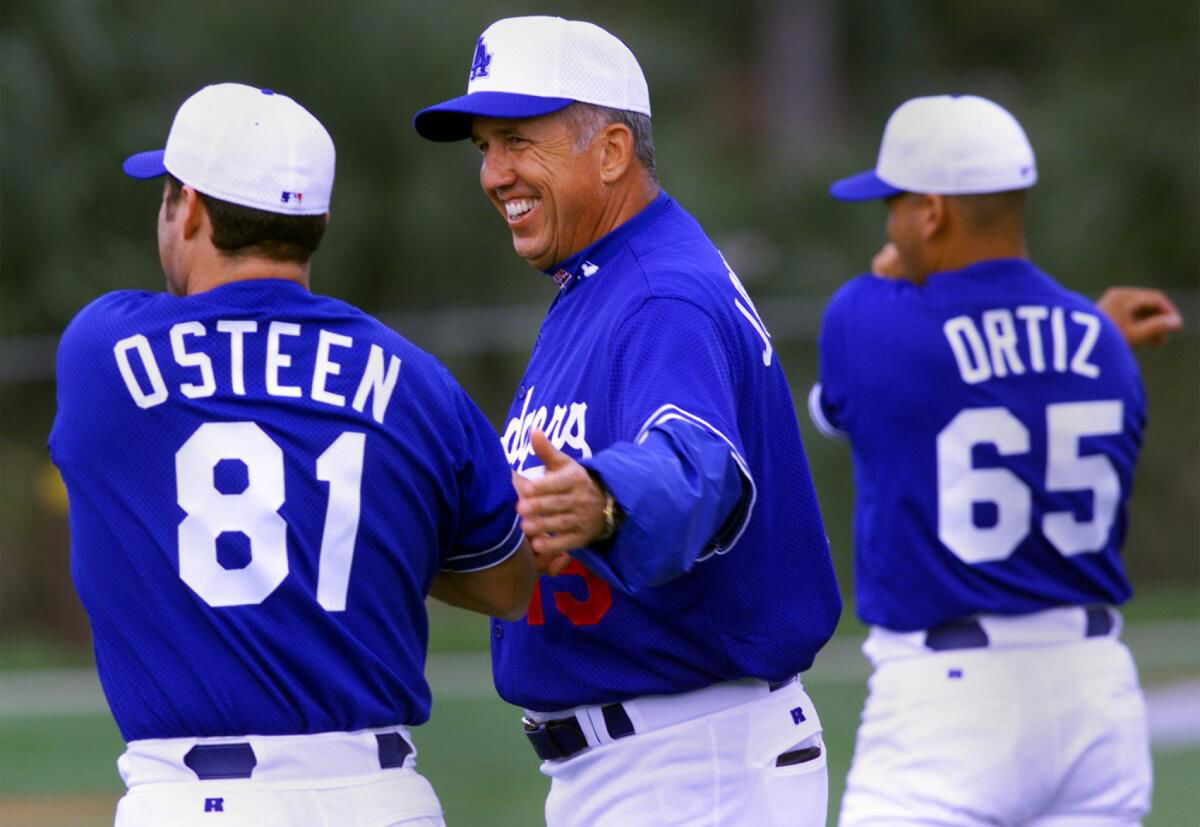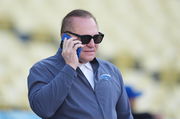
Imago
Credits: LA TIMES/ Dodgers manager Davey Johnson has a warm greeting for non–roster pitcher Gavin Osteen and other players during the first day of spring training in Vero Beach, Fla., on Feb. 19, 1999. (Robert Gauthier / Los Angeles Times)

Imago
Credits: LA TIMES/ Dodgers manager Davey Johnson has a warm greeting for non–roster pitcher Gavin Osteen and other players during the first day of spring training in Vero Beach, Fla., on Feb. 19, 1999. (Robert Gauthier / Los Angeles Times)
Every great turnaround needs a spark. He took over a Mets team that hadn’t won a pennant since 1973, but then in 1984, he led them to a franchise-record 595 victories. However, now that his last chapter ended, he didn’t leave behind numbers. Instead, he left behind the respect and affection from the players who trusted him completely.
Watch What’s Trending Now!
The man was Davey Johnson. On Friday, he passed away in Sarasota, Florida, leaving behind one of the most important careers in Mets history. He was the manager from 1984 to 1990, and he didn’t simply coach; he brought the franchise back to life by winning the World Series in 1986 and making himself the Mets’ most successful manager. Hours after the news of his death broke, MLB insider Bob Nightengale went on X to talk about how the players who shared the dugout with him in 1986 recalled him fondly.
Darryl Strawberry said, “The greatest manager I ever played for,” and he said that Davey let them “do our own thing.” Keith Hernandez said that he saved his career and praised how he was tough and easy at the same time. Mookie Wilson loved his “player’s manager” style. He was strict when necessary, but he also made the game enjoyable. Dwight Gooden was honest: Davey gave him a chance when he was 19 that changed his life.
ADVERTISEMENT
Ron Darling also referred to him as “my guardian angel.” Roger McDowell put it best when he said, “Our Met family has lost a quality man.” He was a forward thinker who made the most of each player’s strengths.
Davey Johnson tributes from his former Mets’ players:
Darryl Strawberry: “Davey Johnson was the greatest manager I ever played for. He let us do our own thing. This is a sad day for the Mets and for the 1986 Mets family.”
Keith Hernandez: “Without a doubt he saved my career. He…— Bob Nightengale (@BNightengale) September 6, 2025
Behind the heartfelt sentiments lay a tactical genius who changed how teams approached building their lineups. Davey Johnson was very calculative back then, as he used on-base percentage as a measure. His data-driven gut feeling changed Mookie Wilson’s role by moving him out of the leadoff spot and putting guys who consistently got on base ahead of him. This change in analysis gave Wilson the tools he needed to adapt, do well, and help the Mets’ offense more strategically.
ADVERTISEMENT
Johnson also helped Darryl Strawberry evolve from a raw rookie into a respected star. He gave him leeway, which built his confidence and helped Strawberry become an All-Star slugger. This was important for the Mets’ offense as they rose to fame in the mid-1980s.
Not only that, but during the World Series, Johnson gave the players a day off before Game 3, which gave them new energy and set the tone for the Mets’ 7–1 win. He also used platoon lineups and stressed on-base percentage throughout the season. These were innovative measures based on early statistics that helped the Mets win 108 games and win the championship.
ADVERTISEMENT
The tributes only told part of Johnson’s story. To really get a sense of how much he changed baseball, let’s have a look back at decades of change, from the way he played to the way he managed numerous teams in a groundbreaking way.
Building generations: How Davey Johnson redefined players and teams
Davey Johnson was more than just a good second baseman when he came onto the field; he was a force. He played in the MLB for 13 years and was named an All-Star four times, won three Gold Gloves, and was a big part of two Orioles World Series championships. In 1973, he hit 43 home runs as a second baseman, tying the record.
ADVERTISEMENT
He then quietly changed what it meant to be a great manager. Johnson won 1,372 games over 17 seasons, giving him a career win rate of.562. He established his legacy in analytics before the field was popular. While he was with the Mets, he turned around a team that hadn’t won a pennant in a long time, leading them to five straight 90-win seasons and the historic World Series win in 1986.
But his magic didn’t stop in New York. He led the Orioles to their first postseason spot in 13 years and the best record in the AL in 1997, which won him Manager of the Year. In Washington, he led the Nationals to their first-ever postseason and won the National League Manager of the Year award in 2012.
Top Stories
Blue Jays Told to Thwart Dodgers’ Plan After Scott Boras Pushes 24-Year-Old Star to Reject Reds’ Historic Deal

Puerto Rico Forces Francisco Lindor, Carlos Correa & Others to Bid Goodbye to WBC Dream Amid USA Tensions: Report

3 MLB Teams Get Sued: “Systematically Cheated Fans Out of Millions of Dollars”

Aaron Judge-Paul Skenes Confront Daunting Reality as Team USA Faces Shohei Ohtani Challenge

Red Sox Warned Against Risky Marcelo Mayer Gamble Amid Willson Contreras Position Dilemma

Bryce Harper, who Johnson initially managed in the majors, hit a 410-foot home run on Saturday and gestured to the sky as a way to thank a mentor who helped him get to the big leagues quickly and believed in him from the start.
ADVERTISEMENT
ADVERTISEMENT
ADVERTISEMENT
ADVERTISEMENT